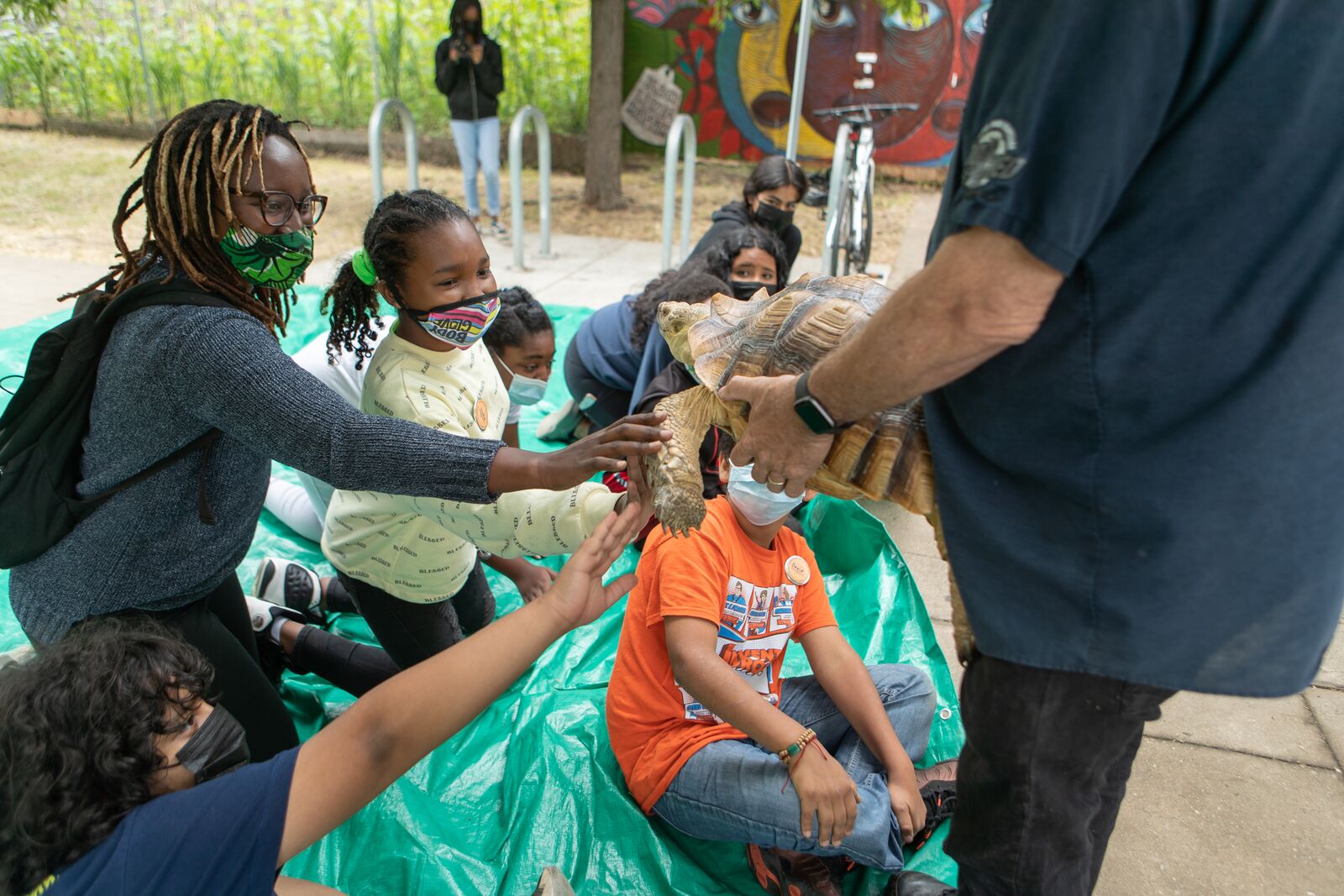The Peralta Hacienda Historical Park is starting the summer camp again
[ad_1]
Free Oakland News, written by Oaklanders, comes straight to your inbox.
One recent afternoon, groups of children attending the Arts, Culture, and Environment Summer Camp at Peralta Hacienda Historical Park sat on color-coded tarps, a different color for each social bubble, to avoid over-mixing and the possible spread of COVID-19 to prevent. They watched with wide eyes as Owen Maercks from the East Bay Vivarium held up various reptiles and exotic frogs. The children, some curious, some scared, listened as he explained where each species was in the world. Across the park, Terry Lee Lima, Food Program Manager at Peralta Hacienda, and Miguel López, Marketing Director, were busy showing another group of teenagers how to prepare for the weekly free food distribution in the parking lot every Thursday as well as the first and third Monday of the month.
A brick wall overlooking Coolidge Avenue is adorned with murals painted on plywood that was used to secure stores around Fruitvale during last year’s riots. Nestled between the side of the park on Coolidge Avenue and the opposite side across from the Victorian house on the Hyde Street side is a community garden tended by Mey Yan Saechao. She and other elders have been growing food in the park since 2003 when Peralta Hacienda worked with Lao Family Community Development to plant the garden so that Laotian Mien women could grow vegetables from Laos. The Mien elders are currently growing green beans, potatoes and corn.
“She just gave us green beans that we will be handing out at the food distribution today,” said López.
“This year is not good,” Saechao said, pointing to the ground. “Last year was better”
Operations in the six hectare park in the heart of Fruitvale are slowly resuming after the pandemic shutdown. López and the park’s team have put together summer programs for children ages 12 and younger, but part of the challenge is that teens cannot currently be vaccinated. Still, many parents have had to find ways to get their children out of their homes after over a year of isolation.
While ACE Summer Camp typically hosts over 200 children per season, López said the team decided to downsize and have two three-week sessions with 60 children. Participants will be divided into social bubbles, with siblings, cousins, and neighbors staying together to minimize the potential risk of COVID-19 spreading.
“At first it was difficult to get children to register,†said Eliott Ahumada, one of the camp’s educators. “As soon as they were here, you can see how resilient they have survived it all.”
Any family in the East Bay can sign up for the Peralta Hacienda’s ACE Summer Camp, but López said the largest number of attendees are from Fruitvale, with around 60-70% being black, low-income families. The camp is free for teenagers aged 5-15 who qualify for a free and discounted lunch.
Camp volunteers must be vaccinated. While this is not required for either the interns or the campers, López said that most of the older interns got their syringes. In addition, the team found in a survey that over 60% of the eligible family members of the campers had already been vaccinated.
Peralta Hacienda Historical Park also recently launched the Oakland 200, a 10-week program for teenagers to learn about the past 200 years of East Bay history and document their own stories in that context. The three teenagers who attended the opening session of the program were filming in Peralta to create mini-documentaries. One of them is about the park’s food distribution program.
Launched two years ago as a one-day initiative starting from a food truck, Peralta’s grocery distribution has grown tremendously. They serve between 150 and 200 families every day. On Thursdays, the team also distributes 200 ready meals through a partnership with World Central Kitchen. Earlier this year, Peralta received a grant from Feeding America that will enable them to continue serving the community.
“We don’t have a set date when we stop distributing food,†said López. “The church will let us know.”
The next big project is the “decolonization of the Peralta Hacienda Historic Park,” said López, changing his name to make it more inclusive with the communities he serves.
The Victorian-style Italian farmhouse that has become a museum in the middle of the park houses relics, photographs and maps that tell the story of the once 44,800-acre ranch owned by the Peralta family in 1820 by the last Spanish governor, Don Pablo Vicente de Solá’s lands that were ruled by Spain – and later Mexico, before being colonized by the United States and admitted to the Union as the State of California – were stolen from the Ohlons when Spanish conquistadors and Catholic missionaries forced many Native Americans to speak Spanish to learn and work as slaves on missions and ranchos. In 1850, three businessmen, Edson Adams, Andrew Moon, and attorney Horace Carpenter, confiscated 160 acres from the Peralta family to eventually become part of the City of Oakland.
The museum won’t be fully open to the public until January 2022 with a public celebration. López said that while it was important to preserve the history of the park’s origins, changing its name is a way to decolonize the space and move forward.
[ad_2]

